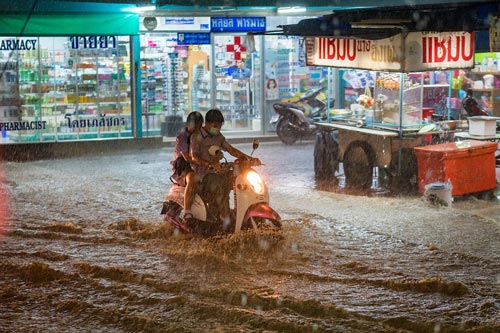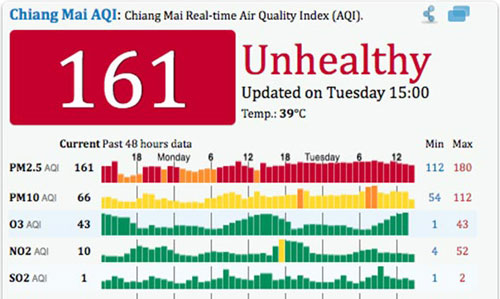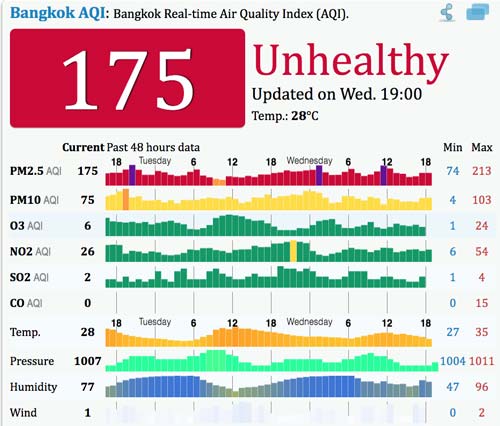The rainy season in Thailand starts from the middle of May and continues until the middle of October, when rain becomes less frequent.
It isn't quite that simple though, as some parts of Thailand experience more rain than other parts at different times.
When the main rainy season passes, weather in the North and the Northeast gets cooler from October to January, while rain in the South continues until December.
The rainy season is a blessing and a curse. It can bring flash floods and dangerous situations, as electricity poles are struck by lightening and wires fall into pools of water.
On the other hand it washes away the dirt, brings vital replenishment to crops and clears the atmosphere for some fresh air!
I've seen some harsh rainy seasons, particularly in Koh Samui, where boats have been used to navigate Chaweng High Road.
Then in Bangkok in 2012, when flooding got so bad that people couldn't go out. Food supplies in local stores ran out as delivery trucks couldn't get through the water.
The army were called in and it was all hands on deck to protect property with sandbags and help old people and young children get around.
What I've learned over the years is to be smart, to prepare in advance. Here's my top tips!
The Rainy Season in Thailand: A 10-Step Survival Guide

1. Carry a Compact Brolly
I thought we'd start with an obvious one, yet you'd be surprised how many people I see at the station each day who forgot to take an umbrella to work.
However, emphasis is on the word “compact”. Pavements in Thailand tend to be quite narrow, and as such you will be required to drop, dip and duck with your brolly as you avoid taking someone's eye out.
2. Beware of Cheap Flip Flops
Cheap flip flops with zero grip are a “no no” during rainy season.
I've seen many a person going ‘arse over tit' as a slippery stream of water rushes under foot, so get some grippy, waterproof shoes/boots to protect against rapid downpours and flash floods.
That said, flip flops can be a blessing when you turn a corner and the water is ankle high. Carry a pair in your bag so you can slip off your decent shoes and wade through the water in your flippers. Go slowly!
3. Respect the Dangers of Lightening
If you get caught outside in the rain and lighting begins to strike, you must avoid water and high ground.
Avoid open spaces and all metal objects, including electric wires, fences, machinery, motors and power tools, etc.
Don't be a hero. If you have to take shelter for half an hour, then do it. Wait it out. I've seen people swimming in my apartment pool when it's raining. This is just silly.
4. Take Proper Shelter When Outdoors
Whatever you do, don't stand under a tree!
Find shelter in a substantial building or in a fully enclosed metal vehicle such as a car, truck or a van – not a Tuk Tuk!
Rather than sprint home to get inside as quick as possible, be safe and duck into a supermarket or 7/11 for shelter. Better to wait 15 minutes than to break a leg!
5. Close Windows & Doors When Inside
Storms are pretty cool to watch, and it can be tempting to stand out on the balcony and watch the lightning bolts.
However, lightening can easily strike you on your balcony or through an open window as you sit and ponder the rain (see the video below).
Be safe, shut the windows and doors and stay inside.
6. Walk if You Can (Once the Rain Stops)!
If you don't mind getting your feet wet, you gain considerable advantage during the rainy season.
Firstly, the roads tend to be more dangerous than usual. A quick, heavy downpour can make roads slippy and cause heavy congestion. People start rushing to get home and the risk of accident increases.
Taking a Tuk Tuk or motorbike taxi isn't advisable, and if it's rush hour it's likely you'll have trouble getting one too.
Over short distances, you can get around faster on two legs. However, if it's thunder and lightening outside, you're better off staying at home and being safe and dry.
✓ Your Next Read: A Complete Guide to Weather & Seasons
7. Stock up On Essential Supplies
The tropical rainstorms in Thailand tend to last somewhere between 15-45 minutes.
That said, in previous years flooding has made street access difficult in some areas, and caused panic food buying at local stores.
Think ahead and stock up on essential items with at least three day's worth of supplies. Double that figure for drinking water.
8. Know Your Emergency Telephone Numbers
It's common to see accidents in the rainy season, and hospitals all over the country are busy with cuts, bruises and breaks.
The rainy season is a particularly dangerous time for old people and children, and so it bodes well to know your emergency numbers in case a situation suddenly arises whereby you need to provide assistance.
Here's some important numbers, which can be dialed straight from your phone:
- Emergency call center (Police, Fire, Ambulance): 191
- Police: 191
- Fire Brigade: 199
- Ambulance: 1554
- Tourism Police (English, French, and German languages): 1155
- Highway Police: 1193
9. Prepare a Survival Kit (Rural/Island Dwellers)
This survival tip is geared toward those living on the islands or in fairly remote, rural parts of Thailand where harsh weather conditions may cause electric power, gas and water services to be interrupted.
Prepare a disaster supply kit containing essential items such as food, water, and sturdy clothing, capable of sustaining a family for up to three days. Here's a solid list, as provided by the folks at Moonsoon.org:
- Three gallons of water in clean, closed containers for each person and pet
- First aid kit
- A stock of food that requires no cooking or refrigeration
- Portable and working battery-operated radio, flashlights, and extra batteries
(Candles and oil lamps are fire hazards) - Necessary medications
- Back-up power source for life support or other medical equipment that requires electricity to function
✓ Your Next Read: Did it Really Snow Once in Thailand?
10. Spare a Thought for the Animals
Many street dogs and feral cats struggle during the rainy season. Their normal environment is disrupted: sleeping spots are wet and uninhabitable and food is in short supply due to it being washed away by the rain.
Put some food out for that local mutt that looks a tad on the thin side, and for the kitten that miaows expectingly each time you walk past.
If you see an animal in distress, Google a number for your local rescue centre and report the incident immediately. If you're in Bangkok or Phuket, you can call Soidog.org.
Take care and enjoy the rain, from a distance!
Last Updated on



Melissa says
Mar 13, 2014 at 5:41 am
TheThailandLife says
Mar 13, 2014 at 11:42 am